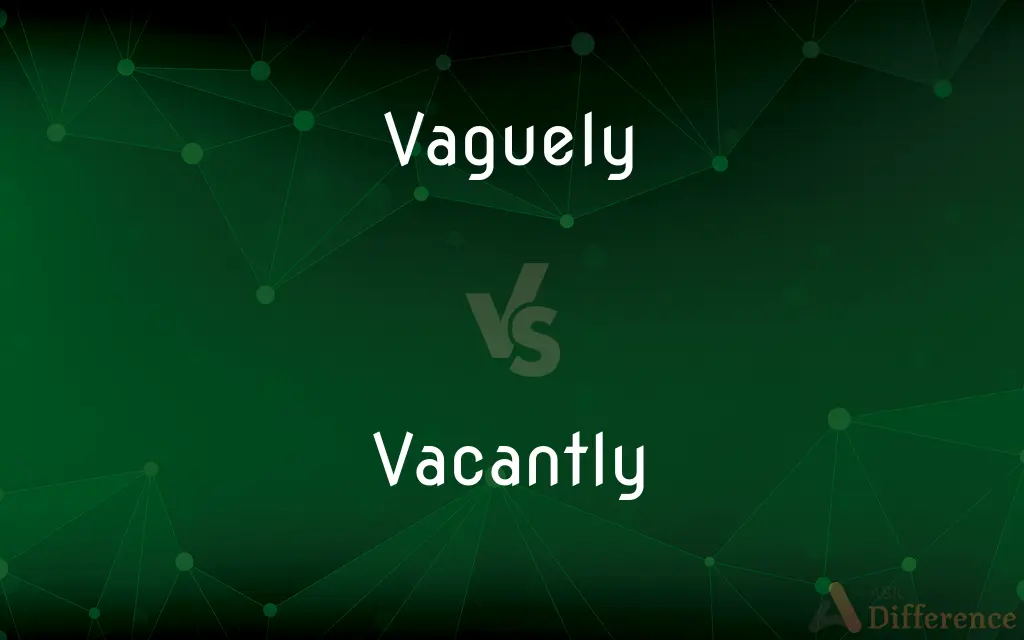Vaguely vs. Vacantly — What's the Difference?
By Tayyaba Rehman — Published on January 5, 2024
Vaguely means in a way that is not clearly expressed or understood, while vacantly refers to an expression or manner that is empty or lacking in thought or emotion.

Difference Between Vaguely and Vacantly
Table of Contents
ADVERTISEMENT
Key Differences
Vaguely is used to describe something that is unclear, imprecise, or lacking in detail. Vacantly refers to a state of emptiness, often in the context of a person's expression or gaze, indicating a lack of thought or awareness.
When someone remembers something vaguely, they recall it without clear details. In contrast, if someone stares vacantly, they look without focus, often implying a disengaged or absent mind.
Vaguely can also imply a sense of uncertainty or ambiguity in perception or understanding. Vacantly, however, is more about the absence of mental engagement or emotion in one’s expression or actions.
In communication, a statement made vaguely might be ambiguous or lacking in specifics. Meanwhile, a person responding vacantly may show an absence of understanding or interest, often appearing disinterested or disconnected.
Vaguely often modifies descriptions of thoughts, memories, or expressions, suggesting a lack of clarity. Vacantly is typically used to describe a manner or look that is devoid of thought, emotion, or expression.
ADVERTISEMENT
Comparison Chart
Definition
Not clearly expressed or understood
Empty, lacking thought or emotion
Context of Use
Describing unclear memories or ambiguous details
Describing a blank or disengaged expression or gaze
Implication
Uncertainty or lack of precision
Absence of mental engagement or emotion
Typical Application
In communication, thoughts, or perceptions
In expressions, mannerisms, or looks
Connotation
Ambiguity, uncertainty
Emptiness, disengagement
Compare with Definitions
Vaguely
Lacking clarity or distinctness.
She vaguely remembered his face, but couldn't recall his name.
Vacantly
Showing an absence of thought or awareness.
She looked vacantly into the distance, ignoring the chaos around her.
Vaguely
To a slight degree; not distinctly.
She felt vaguely uneasy about the decision.
Vacantly
Emotionally or intellectually empty.
He laughed vacantly, not really understanding the joke.
Vaguely
Without detailed or complete information.
He vaguely mentioned the meeting but didn't provide details.
Vacantly
Expressing nothing; devoid of response or reaction.
She gazed vacantly at the painting, feeling nothing.
Vaguely
In an unclear or indefinite manner.
He vaguely described the location, leaving us confused.
Vacantly
Without purpose or intent; aimlessly.
They wandered vacantly through the streets, with no destination in mind.
Vaguely
Indistinctly or unclearly perceived.
The path ahead appeared vaguely through the fog.
Vacantly
With no expression of intelligence or emotion.
He stared vacantly at the screen, lost in thought.
Vaguely
Not clear in meaning or expression; inexplicit.
Vacantly
Containing nothing; empty
Vacant space.
Vaguely
Not thinking or expressing oneself clearly
"Most of us are quite vague about the theoretical underpinnings of the medical theories that guide our doctors" (Kwame Anthony Appiah).
Vacantly
Not occupied or put to use
A vacant row of seats.
Vaguely
Lacking definite shape, form, or character; indistinct
Saw a vague outline of a building through the fog.
Vacantly
Without an incumbent or occupant; unfilled
A vacant position.
Vaguely
Indistinctly felt, perceived, understood, or recalled; hazy
A vague uneasiness.
Vacantly
Not filled with any activity
Vacant hours.
Vaguely
In a vague manner.
He looked vaguely around the room, as if lost.
Vacantly
(Law) Lacking an identified heir
A vacant estate.
Vaguely
Loosely; more or less; somewhat.
Vacantly
Lacking intelligence or knowledge
A vacant mind.
Vaguely
In a vague manner.
What he vaguely hinted at, but dared not speak.
Vacantly
Lacking expression; blank
A vacant stare.
Vaguely
In a vague way;
He looked vaguely familiar
He explained it somewhat mistily
Vacantly
In a vacant manner; inanely or foolishly.
Vacantly
In a vacant manner; inanely.
Vacantly
In a vacant manner;
She was staring vacantly into the room
Common Curiosities
What is an example of using vaguely correctly?
"She vaguely recalled the way to her old school."
What does it mean to describe something vaguely?
Describing vaguely means providing information that is not clear or detailed.
Is vacantly always negative?
Vacantly often has a negative connotation, implying emptiness or lack of engagement.
Can vacantly describe a tone of voice?
Yes, a tone can be vacantly emotionless or disinterested.
Can vaguely be used positively?
Vaguely can be neutral or slightly negative, depending on context.
Is it correct to say 'vaguely happy'?
Yes, "vaguely happy" implies a sense of happiness that is not strong or clear.
How does vacantly differ in body language interpretation?
Vacantly suggests a lack of engagement or emotion in body language.
Can a memory be described as vacantly?
Typically, memories are described as vague, not vacant.
What does 'thinking vaguely' imply?
It implies thinking in an unclear, imprecise, or not fully formed manner.
How does vacantly describe a person's gaze?
A vacant gaze implies an empty, unfocused, or unresponsive look.
What does a vacant smile suggest?
It suggests a smile that lacks genuine emotion or feeling.
Is it possible to act vaguely?
Yes, acting vaguely would involve doing something without clear intention or purpose.
Are vague and vacant synonyms?
No, they have different meanings and contexts of use.
How does vaguely affect communication?
Vague communication can lead to misunderstandings or lack of clarity.
Can someone speak vacantly?
Yes, speaking vacantly would imply speaking without emotion or engagement.
Share Your Discovery

Previous Comparison
Autodesk vs. Autocad
Next Comparison
OLTP vs. OLAPAuthor Spotlight
Written by
Tayyaba RehmanTayyaba Rehman is a distinguished writer, currently serving as a primary contributor to askdifference.com. As a researcher in semantics and etymology, Tayyaba's passion for the complexity of languages and their distinctions has found a perfect home on the platform. Tayyaba delves into the intricacies of language, distinguishing between commonly confused words and phrases, thereby providing clarity for readers worldwide.













































